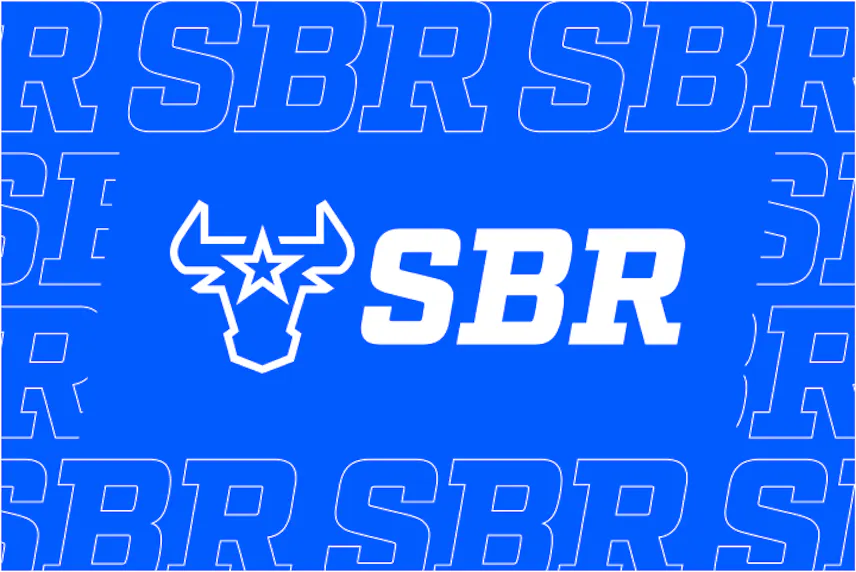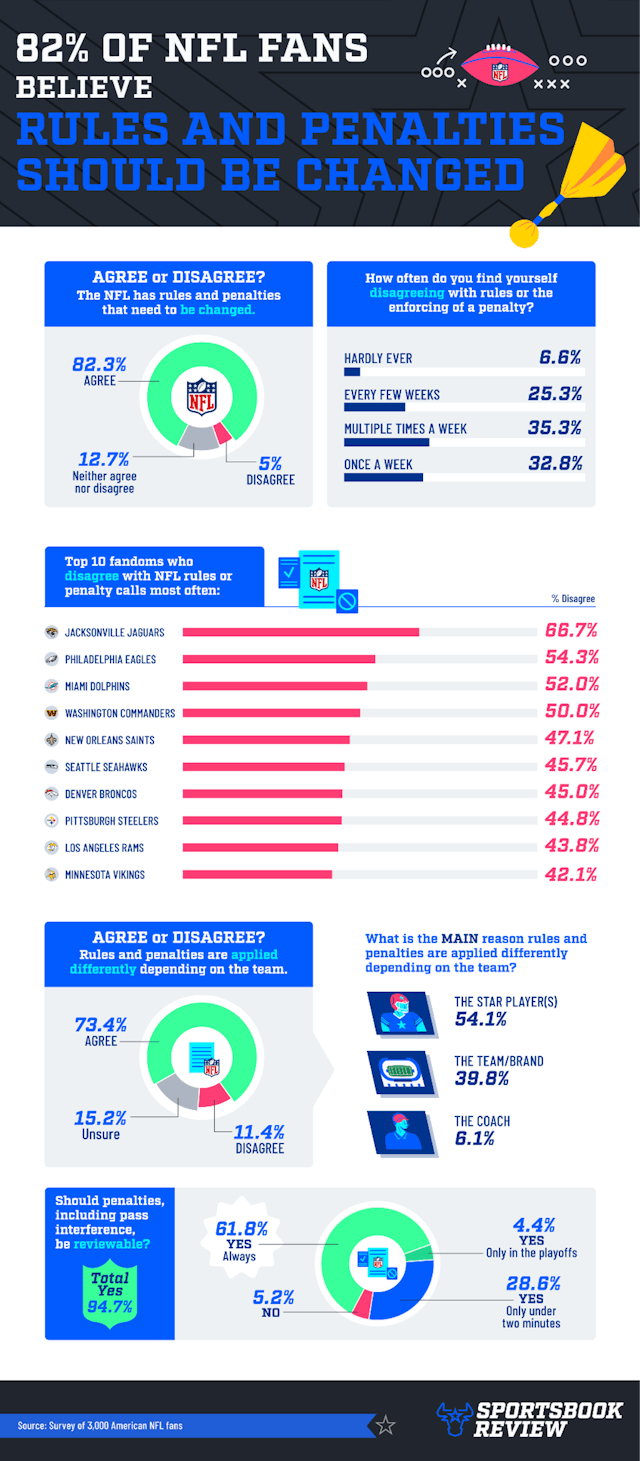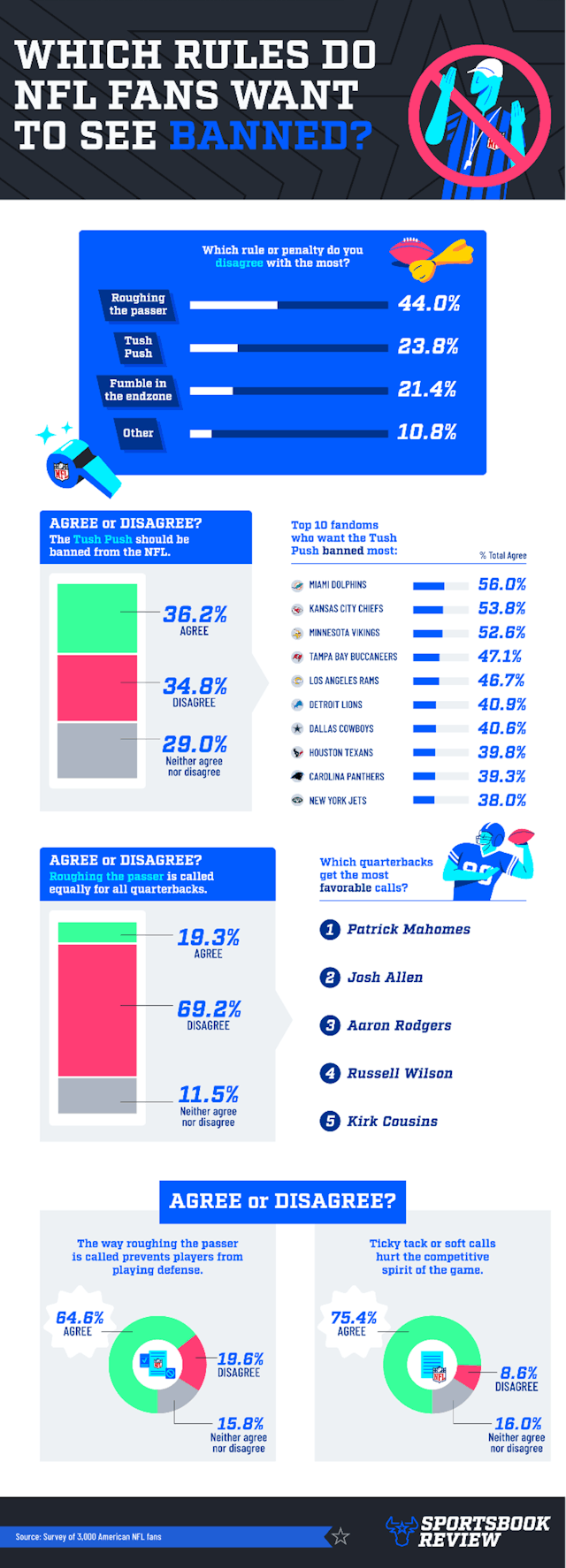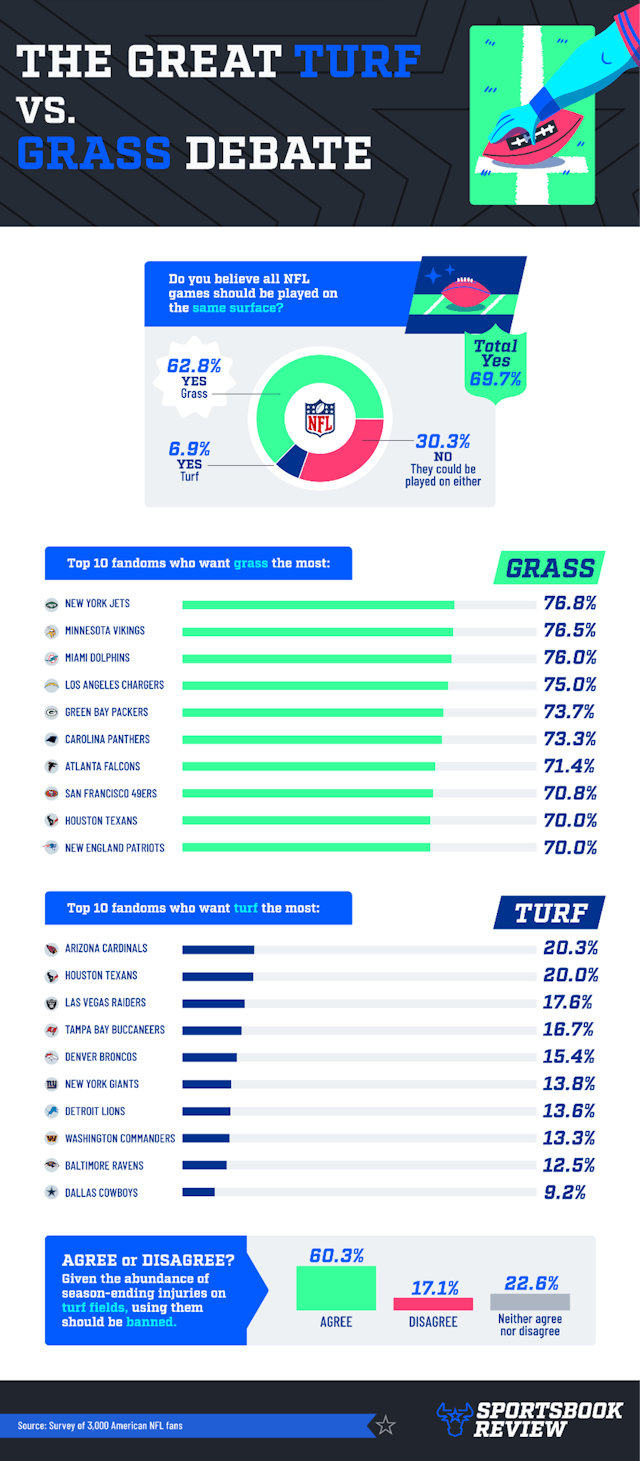NFL Fans Demand Rule Changes and Grass Playing Surfaces

Last Updated: February 5, 2024 9:29 AM EST • 7 minute read X Social Google News Link

Rules and regulations in the world of sports, including the NFL, are ever-evolving, as the game adapts to modern technology and innovation.
The game that fans know and love differs from even a decade ago, and many fans are not pleased with the direction in which the NFL is headed. Ranging from the interpretation of rules to the perceived favoritism shown to specific teams, the current state of the league is worrisome to some.
Coupled with growing concerns over the quality of NFL playing surfaces – and the spike in player injuries as a result of poor field conditions – the league might be facing a minor crisis.
So what problems do fans consider the most urgent to fix, and how would they recommend the NFL handle controversial topics such as penalties and playing surfaces? Sportsbook Review surveyed 3,000 NFL fans – and here is what we found.
Key takeaways
- 82.3% of fans feel that the NFL has both rules and penalties that need to be changed
- 73.4% of fans think that rules and infractions are applied differently depending on the team
- Top quarterbacks fans believe receive favorable calls include Patrick Mahomes, Josh Allen, and Aaron Rodgers
- 62.3% of fans believe that all NFL games should be played on grass fields
Rules and Penalties: Fan Perspectives
The NFL has welcomed change in various areas, including in overtime rules and with roster limitations, but, upon further review, it appears their focus has been misplaced. 82.3% of fans agree that the league has both rules and penalties that need to be changed.

These fan bases often feel slighted by officiating. This sentiment reigns true from Miami to Los Angeles, as 35.3% of respondents admit to disagreeing with multiple calls per week, whether during their team’s game or when observing as a neutral fan.
Two-thirds of Jaguars fans (the highest percentage among NFL fan bases) say they disagree with rules or penalty calls most regularly. Jacksonville has currently been whistled for the 9th-fewest infractions in the league (68) and have just one defensive pass interference against all season, but their perception may be based on their opponents and not their own players.
For Seahawks fans, their 12th Man mantra may be indicative of an illegal substitution penalty and not their impactful presence in the stands, as the team has committed the second-most penalties in the league (96). This number seems to not sit well with Seahawks fans, as 45.7% often disagree with rules or penalties called, the 6th-highest percentage among NFL fan bases.
Nearly 3 in 4 NFL fans are under the impression that rules and infractions are applied differently depending on the team, with the assumption that star players impact these calls.
In real-time, catching an infraction or making the proper call isn’t always easy, but there is an easy solution. According to 94.7% of survey respondents, the ability to review penalties, much like the previous pass interference rule, should be allowed.
Quarterback Protection and Favoritism
When a certain play has been named after a team or city, it must be making a notable impact on Sundays. Sure, the Eagles had the Philly Special, but the ‘Tush Push’ or ‘Brotherly Shove’ has become the latest fad in Philadelphia.
In this play call, two offensive players help the quarterback – in this case, Eagles star Jalen Hurts, a +350 contender in the latest NFL MVP odds – into the end zone or over the first down marker by pushing his backside from behind into the offensive line.
How do fans feel about the Tush Push? What other rules would they like to see banned? And which quarterbacks get the most favorable calls on the whole? NFL supporters have spoken:

Travis may be dominating the headlines as the guy on the Chiefs coming straight home to Taylor Swift, but brother Jason and his All-Pro quarterback are the ones in their Touchdown Era, coming straight to the end zone with regularity for the Eagles.
The Brotherly Shove has resulted in nine touchdowns this season for Hurts and the Eagles, more rushing scores than 13 other NFL teams.
Many teams have tried to replicate it to no avail, yet only 36.2% of fans want to see the play call outlawed. Fans of the Miami Dolphins (56%), Kansas City Chiefs (53.8%), and Minnesota Vikings (52.6%) want the Brotherly Shove banned the most after the three teams witnessed a combined four touchdowns on the play.
Even with the play helping bring the Eagles to the best record in the NFC, fans disagree with roughing the passer the most. When surveyed, 23.8% of fans disagreed with the ‘Tush Push’ being allowed in today’s game, but 44% viewed roughing the passer as the biggest issue that needed to be addressed.
Quarterbacks are often protected in the NFL, preventing defenders from making a big-time hit or, at times, doing their job. When it comes to the signal-callers, 73.4% of fans also believe some are given the benefit and preferential treatment over the others.
Kansas City’s Patrick Mahomes, Buffalo’s Josh Allen, and the Jets' Aaron Rodgers are the top QBs fans believe receive favorable calls from the refs. You can point to Mahomes’ embellishment in last season's AFC Championship Game that led to a shorter field goal, or Allen’s league-leading four roughing the passer penalties drawn this season, and fans may have a point.
Ironically, Mahomes played the victim following the Chiefs' Week 14 loss to Allen and the Bills, unleashing a tirade on officials for throwing an offensive offside flag that wiped out the potential game-winning touchdown. Mahomes chastised the referees after the game, and was even seen (and heard) complaining in his post-game handshake with Allen.
Regardless of what side of the Mahomes contention you're on, fans are tired of seeing marginal calls decide NFL games – in fact, 75.4% are under the impression that soft and ticky-tack infractions called hurt the competitive spirit of the game. Yellow towels are certainly welcome in Acrisure Stadium in Pittsburgh, but the other 31 fan bases prefer otherwise.
Playing Surfaces and Injury Concerns
Injuries are a part of sports, ranging from season-ending to forcing players to miss just a few plays, and one component of the game seems to be contributing to their occurrence: the playing surface.
Stadiums across the league utilize turf instead of grass, oftentimes to prevent wear and tear of the playing surface or to be able to host other events, such as concerts or soccer matches. Unfortunately, it comes with a cost.

This season alone, a handful of star players have suffered season-ending or serious injuries while playing on turf instead of grass. Aaron Rodgers suffered a torn-Achilles in the season opener (and his Jets debut), and Chargers receiver Mike Williams saw his season come to a close in Minneapolis with a torn ACL.
Jets fans, who felt joy for a mere four plays this season, are the biggest proponent of switching to grass, with 76.8% in favor of the move.
With MetLife Stadium's playing surface having contributed to a plethora of injuries between Giants and Jets games, teams may need to use the company itself for insurance policies when traveling to New York.
In total, 60.3% of respondents want turf banned and for grass surface to be uniform across the league.
Shockingly enough, Arizona Cardinals fans (20.3%) are the biggest advocate to keep the turf, even after watching star quarterback Kyler Murray tear his ACL on their home field a season ago.
The National Football League has often been dubbed the No Fun League, and rightfully so at times. From policing cleat styles and designs to fining players an excessive amount for simply doing their job, the attention of the NFL is in the wrong place. Both fans of teams with Super Bowl aspirations and those who have had more head coaches than wins this season have all thrown the challenge flag on the current state of the league.
Methodology
To obtain this data, we surveyed 3,000 NFL fans on the current rules and penalties in place in the NFL. 67% of respondents identify as male, while 32% identify as female, and 1% as non-binary. The median age of the respondents was 40 years old.

James Bisson X social





